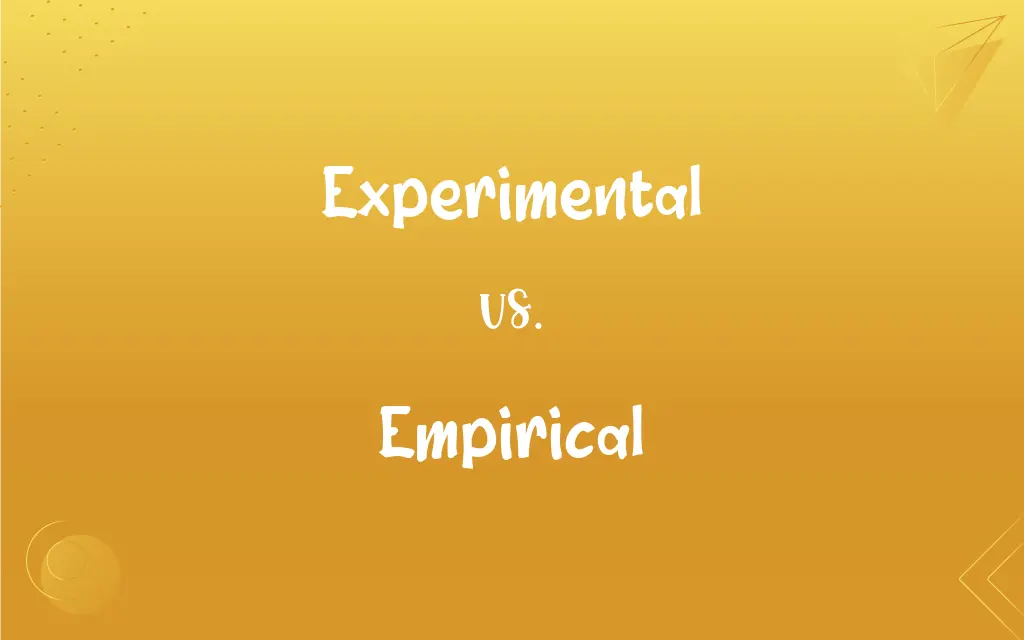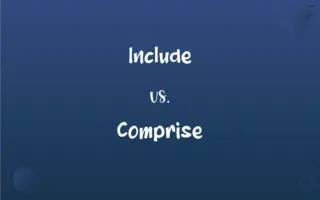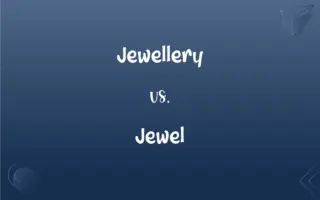Experimental vs. Empirical: What's the Difference?
Edited by Aimie Carlson || By Harlon Moss || Updated on November 7, 2023
Experimental refers to the process of testing or trying out new ideas, while empirical relates to knowledge gained by observation or experience rather than theory.

Key Differences
"Experimental" relates to the concept of conducting experiments, which are controlled procedures to discover, test, or demonstrate something. "Empirical" refers to knowledge that is based on observed and measurable evidence subject to specific principles of reasoning.
An "experimental" approach often involves a trial-and-error process to explore new theories or ideas. "Empirical" methods, on the other hand, rely on verifiable observation, often used to validate or challenge existing theories.
"Experimental" can also describe something innovative or new that is not yet proven or established, like experimental art forms. "Empirical" implies a methodology that collects data through direct or indirect observation or experience.
In research, "experimental" studies involve manipulation and controlled testing of variables. "Empirical" research, while it may include experiments, is characterized by the collection of data to establish patterns or facts.
The term "experimental" captures the essence of inquiry and the spirit of innovation. In contrast, "empirical" signifies a commitment to evidence-based understanding and the accumulation of practical data.
ADVERTISEMENT
Comparison Chart
Definition
Involving a trial-and-error process to discover new information
Based on observation or experience rather than theory or pure logic
Approach
Testing of theories, often in a controlled environment
Relying on evidence from observations and experiences
Application
Innovative or untested ideas and techniques
Established methods that use observed data
Research Type
Manipulative, testing variables
Observational, collecting data
Purpose
To explore or prove new concepts
To validate or refute existing knowledge
ADVERTISEMENT
Experimental and Empirical Definitions
Experimental
Involving a test to discover something unknown.
The scientist conducted an experimental study to test the hypothesis.
Empirical
Verifiable or provable by means of observation or experiment.
Empirical data from the study was used to formulate a new drug.
Experimental
Based on untested ideas or techniques rather than on experience.
They recorded an experimental album that defied traditional genres.
Empirical
Derived from experiment and observation rather than theory.
Her empirical research confirmed the earlier theoretical predictions.
Experimental
Used to describe a new invention or method that is being tried for the first time.
The engineers are working on an experimental design for the new engine.
Empirical
Relying on or derived from observation or experiment.
The empirical evidence supported the new scientific model.
Experimental
Serving as a trial or tentative model for future experiments or developments.
The experimental phase of the project yielded promising results.
Empirical
Measurable or observable, not theoretical.
The theory must be substantiated with solid empirical findings.
Experimental
Pertaining to a novel approach or idea that has not been widely accepted yet.
The gallery showcased experimental art from emerging artists.
Empirical
Of or relating to empiricism or empirical methods.
The empirical approach to science involves systematic data collection.
Experimental
Relating to or based on experiment
Experimental procedures.
Experimental results.
Empirical
Relying on or derived from observation or experiment
Empirical results that supported the hypothesis.
Empirical
Verifiable or provable by means of observation or experiment
Empirical laws.
FAQs
Can empirical research be non-experimental?
Yes, it can involve natural observations without manipulation.
Are empirical methods limited to science?
No, they are used in any field that relies on observed data.
What is an experimental study?
A study where conditions are controlled to test hypotheses.
Do experimental studies always provide empirical data?
Yes, as they are based on controlled observation or experience.
Can experimental results become empirical evidence?
Yes, once they are observed, measured, and verified.
Is empirical knowledge always objective?
Ideally, it is objective, but interpretation can introduce subjectivity.
Can empirical findings lead to new experiments?
Yes, empirical findings often inspire further experimental research.
Is an experimental approach subjective?
It can be, as it often explores new, unproven areas.
What is an experimental design?
A plan for conducting an experiment to test a hypothesis.
What does empirical mean in statistics?
Pertaining to data gathered by observation or experimentation.
What is empirical evidence?
Evidence that is observable and measurable.
Can an experimental technique be empirical?
Yes, if it involves direct observation or experience.
How do experimental methods relate to science?
They are fundamental to scientific inquiry and discovery.
What's the importance of empirical research in academics?
It provides a foundation for credible and validated knowledge.
Are all scientific methods empirical?
Most are, as they rely on evidence and observation.
How do you validate an experimental hypothesis?
Through repeated experiments and empirical data analysis.
What makes an experiment experimental?
The controlled conditions and manipulation of variables.
Are experimental treatments based on empirical data?
They often start with empirical data but also test new grounds.
Why is empirical evidence reliable?
Because it's based on direct observation and can be replicated.
What does it mean if a finding is not empirical?
It may be theoretical, not based on observable evidence.
About Author
Written by
Harlon MossHarlon is a seasoned quality moderator and accomplished content writer for Difference Wiki. An alumnus of the prestigious University of California, he earned his degree in Computer Science. Leveraging his academic background, Harlon brings a meticulous and informed perspective to his work, ensuring content accuracy and excellence.
Edited by
Aimie CarlsonAimie Carlson, holding a master's degree in English literature, is a fervent English language enthusiast. She lends her writing talents to Difference Wiki, a prominent website that specializes in comparisons, offering readers insightful analyses that both captivate and inform.































































